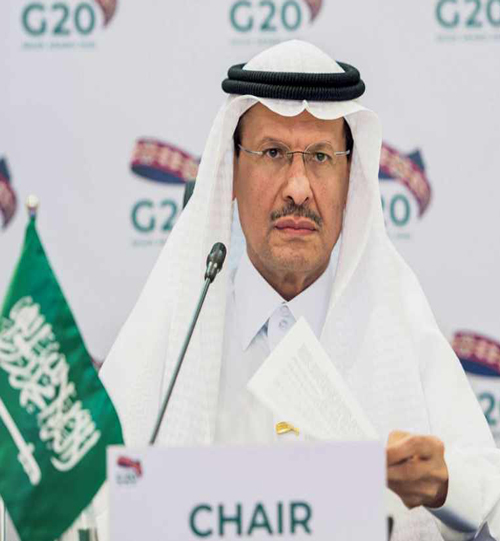Dubai
Energy ministers from the G20 nations last night agreed to measures to rebalance global oil markets ravaged by the coronavirus pandemic.
Following a marathon session of virtual talks, their communique made no direct mention of oil cuts.
Earlier, their discussions focused on a plan developed by the OPEC+ alliance, and led by Saudi Arabia and Russia, to cut oil output by an unprecedented 10 million barrels a day. Non-OPEC+ countries such as Canada, the US and Brazil were expected to implement additional, substantial output reductions of their own.
The agreement — which includes the three biggest producers: Saudi Arabia, the US and Russia — represented the biggest-ever attempt to coordinate global oil production.
Saudi Arabia’s Energy Minister Prince Abdulaziz bin Salman chairing a virtual extraordinary meeting of G20 Oil ministers in Riyadh on April 10, 2020.
(SPA) Progress was held up by Mexico, which was reluctant to reduce its output by 23 percent, as had been by other members of the Organization of Petroleum Exporting Countries. The nation’s concerns were addressed through the intervention of US President Donald Trump.
He became personally involved in the negotiations after last week saying he expected cuts of about 15 million barrels a day to tackle the glut of oil on global markets.
Some experts estimate demand has slumped by 30 percent since nations began locking down to tackle the pandemic. If production had continued at previous rates, storage facilities would have been overwhelmed within weeks, leaving producers facing the risky option of “shutting in” wells, which means halting production.
“National health systems have been strained and economic-growth prospects have been impaired,” Prince Abdul Aziz bin Salman, the Saudi energy minister, told the G20 meeting. “Global financial markets are in turmoil, as are global energy markets, with negative effects on both their stability and security.
“The uncertainty in energy markets has spilled over into many other sectors, including manufacturing and transport, and has slowed the pace of investment in future energy supplies, both hydrocarbons and renewables.”
He underlined the seriousness of the challenge facing the industry: “In this time of crisis, reliable, affordable and accessible energy is critical to powering our essential services, including health care, to ensure we can quickly advance recovery efforts, on both national and global scales.”
Whether the G20 and OPEC+ agreements are effective will become apparent when global oil markets reopen next week.
“Gulf producers will be hoping that the deal is at least enough to put a floor under oil prices but we’ll have to wait until Monday when the markets start trading again,” said Paul Young, head of energy products at Dubai Mercantile Exchange.
Crude prices have fallen by about 50 percent in the past month, partly due to the economic effects of the pandemic and partly as a result of aggressive production by producers, including Saudi Arabia.—Arab News










